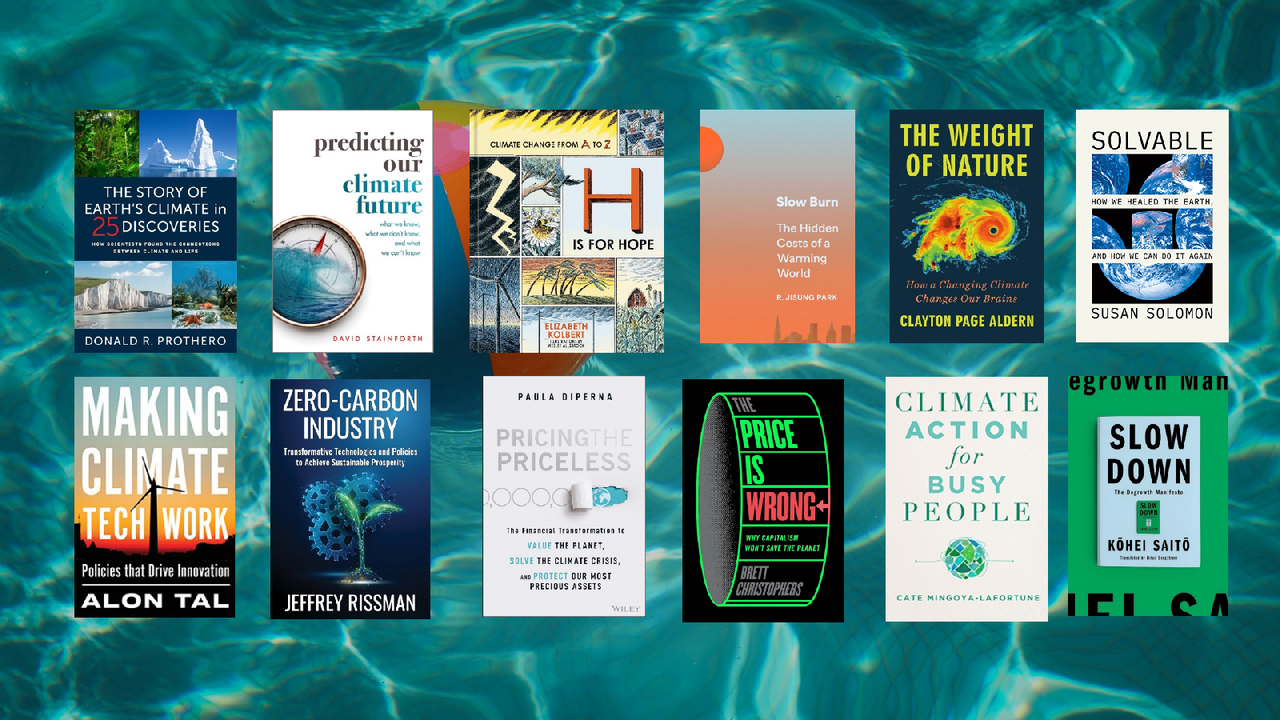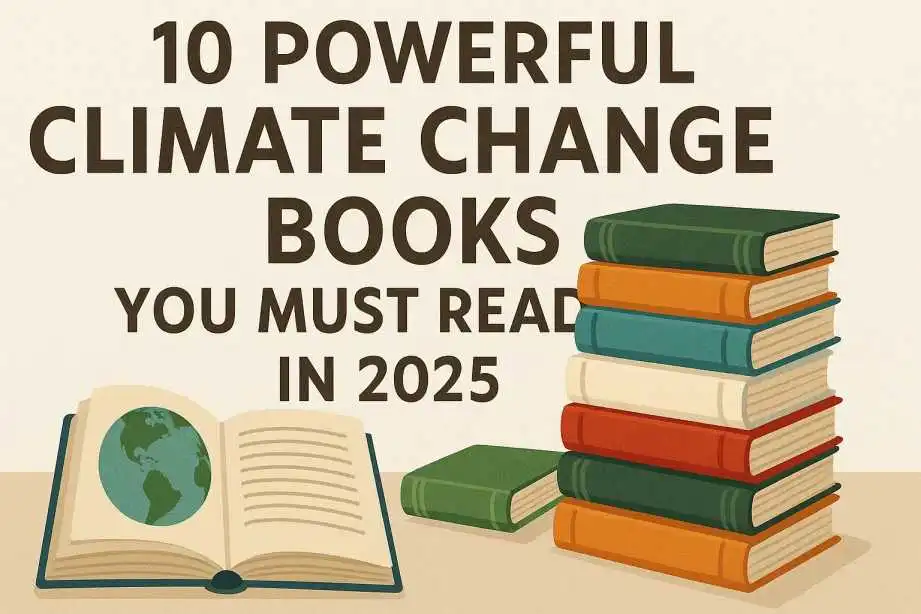As the climate crisis deepens, more readers are turning to books to understand the science, politics, and personal stories behind global warming. Whether you’re looking to educate yourself or inspire change, climate change books offer valuable insight into one of the most pressing issues of our time. In this blog, we explore some of the best books on climate change that you should read in 2025.
For this October, the month some time recently the presidential decision, Yale Climate Associations has distinguished sufficient convenient titles to fill two bookshelves: one on climate activity, the other on discretionary legislative issues.
This bookshelf presents the titles on climate activity—or maybe we ought to say inaction. Scientists and concerned citizens have been crying out for activity on climate change for so long—for decades, in reality—that a few histories of American inaction have presently been composed.
Why Read Climate Change Books?

Books have the power to make complex topics accessible. From scientific explanations to activist memoirs, climate change books help readers understand the causes, consequences, and solutions related to global warming. They also offer a deeper emotional connection to the crisis than short articles or news clips.
Read Also: How to Choose the Best Fantasy Books of All Time?
There have been shining spots, the best books on climate change, for one. President Obama’s Uncommon Emissary for Climate Alter Todd Strict gives a firsthand account of the American side of those arrangements.
By the by, the accessible proof shows that we will “overshoot” the temperature targets set in the ascension, both the favored (underneath 1.5°C) and the fallback (2°C) targets. In their modern book, activists and scholars Wim Carton and Andreas Malm play out the results of inaction going forward.
Reporter Diminish Schwartzstein and security examiner Sherri Goodman, as of now, see the critical results of climate change forming worldwide legislative issues and key arrangements. Individuals moving absent from climate-damaged situations, and the savagery such breakdowns unleash, will destabilize the nations and polities to which they escape.
How ought citizens in these nations react? Teacher of natural law David Spence gives a point-by-point account of how compelling vitality control has now and then been conceivable in the U.S. over the final century. But he presently sees modern stresses on the political framework that are making horrendous circles of disdain and inaction.
Writer Cameron Abadi and extremist Margaret Klein Salamon offer contradicting takes on climate radicalism. Both would concur, be that as it may, that climate activity is among the best cures for climate uneasiness.
Social logicians Dominic Pettman and Eugene Thacker go further, proposing that we are required to make unused mental and social spaces for encountering and understanding the feelings that emerge from our (in)actions in reaction to climate change.
So, What’s the Best Books About Climate Change?
The final three titles in this bookshelf offer unused ways to activity. Realistic creator Esther Gonstalla has made an “atlas” of climate dangers and arrangements. Climate researcher Victimize Jackson gives an upgrade on the science and advances of carbon expulsion and places that story in a greater picture of comprehensive climate activity.
In discussions with individuals profoundly locked in in a wide assortment of climate activities, marine scientist and climate advocate Ayana Elizabeth Johnson portrays a way forward by envisioning our goal: “What if we get it right?”
The great news nowadays is that open supposition is at its most elevated level of bolster for climate activity, from corporate meeting rooms grasping supportability for commerce reasons to developments driven by enthusiastic, more youthful eras.

Who can’t bear to stand quiet since it is they who will acquire the most exceedingly bad natural catastrophes. If the missed openings in Washington are teachers, the way to act is clear. Our chosen authorities must utilize their workplaces not exclusively for the control and distinction it presents, but for the open great—and they must do so while there is still time.
Related Post: Is the Perfect Couple on Netflix Based on a Book?
The best books about climate change was one of the most troublesome and confident accomplishments of the twenty-first century: 195 countries at long last concurred, after 20 long years of attempting, to build up a driven, operational administration to address one of the most noteworthy civilizational challenges of our time.
In Landing the Paris Climate Accord, Todd Stern, the chief U.S. moderator on climate change, gives an inside account from the rooms where it happened: the full, charged, seven-year story of how the Paris Accord came to be, taking after a circular segment from Copenhagen to Durban to the mysterious U.S.
China climate bargain in 2014 to Paris itself. A one-of-a-kind look behind the window ornament, Landing the Paris Climate Ascension is an imperative and interesting peruse for anybody who cares approximately the future of our one shared home.
Top 5+ Best Books On Climate Change for 2025
Overshoot: How the World Surrendered to Climate Breakdown by Wim Carton and Andreas Malm (Verso Books 2024, 416 pages, $29.95)
The world is on the cusp of one and a half degrees of warming. But indeed, some time recently, one and a half climate calamities have struck with ever more destructive constraint. And that restraint will be overshot—maybe two degrees as well. How did this happen? What strengths are driving us into a climate that individuals—especially destitute individuals in the Worldwide South won’t be able to adapt to?
In Overshoot: How the World Surrendered to Climate Breakdown, Andreas Malm and Wim Carton show a history of the show stage of the emergency, as the fossil fuel industry swims in the biggest benefits ever made.
Cash proceeds to stream into the development of pipelines, stages, terminals, and mines—resources that will have to be crushed for the planet to stay decent. Clearing in scope, mixing and calming, Overshoot lays out the stakes for the climate battle in the long time ahead.
The Warm and the Anger: On the Frontlines of Climate Savagery by Dwindle Schwartzstein (Island Press 2024, 328 pages, $32.00)
As a writer on the climate security beat, Dwindle Schwartzstein has gone by desolated Iraqi towns where ISIS utilized dry spells as a selecting device and weapon of fear.
In Bangladesh, he has met farmers-turned-pirates who can no longer make a living off the land and instead make it off grisly ransoms. Security strengths blocked him from a dam being developed along the Nile that has brought Egypt and Ethiopia to the brink of war.
In The Warm and the Anger, Schwartzstein deftly shows that climate change is frequently the spark that lights long-smoldering fires, the additional push that pushes people, communities, and indeed countries over the line between dissatisfaction and deadly anger. Schwartzstein’s unparalleled on-the-ground detailing and sharp sense of human nature offer the clearest picture to date of the viciousness that undermines us all.
Threat Multiplier: Climate, Military Authority, and the Battle for Worldwide Security by Sherri Goodman (Island Press 2024, 272 pages, $35.00)
Threat Multiplier takes us into the war zone and the interior of the Pentagon to show how the U.S. military is standing up to the greatest security challenge in worldwide history: climate change. More than thirty years ago, when Sherri Goodman got to be the Pentagon’s firstChief Natural Officer, no one would have envisioned this part for our equipped strengths.
But presently the Pentagon considers climate in war recreations, calamity alleviation arrangements, worldwide strategy, and indeed the plan of its possessed bases.
What was the key to this emotional alter in military considering? No one is way better balanced to reply to these questions than Sherri Goodman, a natural pioneer among our equipped strengths and civilian agents. In Risk Multiplier, she tells the interior story of the military’s battle for worldwide security, a story that is as confident as it is harrowing.
Climate of Disdain: How to Protect the U.S. Vitality Move from Voter Partisanship by David B. Spence (Columbia College Press 2024, 380 pages, $28.00 soft cover)
Why is the United States battling to sanction arrangements to decrease carbon outflows? In Climate of Disdain, David B. Spence offers a voter-centric, bottom-up clarification of national climate and vitality legislative issues, one that pinpoints severe partisanship as the key obstruction to transitioning to a net-zero carbon future. Individuals in Congress react to voters whose enmity toward the restricting party makes compromise politically unsafe.
The social media that constitute today’s data environment intensify outrage, spread half-truths and misrepresentations, and sow division. How, at that point, can we construct a broader climate consolidation? Spence argues that participation on this significant issue is still conceivable, but it will require supported person-to-person engagement. With its sharp understanding of our legislative issues, Climate of Scorn offers trust for a net-zero future.
Climate Radicals: Why Our Natural Legislative issues Isn’t Working by Cameron Abadi (Columbia Worldwide Reports 2024, 192 pages, $18.00 paperback)
In Scientific books on climate change, Cameron Abadi profiles the intriguing activists of Letzte Era, known for tossing nourishment on works of craftsmanship.
Ende Gelände, which requests the quick phaseout of coal; and the German pioneers of Fridays for Future, which organizes school strikes and large-scale exhibits. Abadi finds that the groups’ uncompromising positions and shock over barely characterized approach disappointments have driven them to extraordinary acts of reputation that bolster their sense of criticalness.
In differentiation, Joe Biden’s American Swelling Decrease Act of 2022 speaks to the most noteworthy move toward green vitality in U.S. history. The law did not inspire bunches like Letzte Era, but Climate Radicals appears to think that political compromise and incremental advance might be the way for governments to battle climate change. In this post, How to find the best books on climate change?
Facing the Climate Crisis: How to Change Yourself with Climate Truth (2E) by Margaret Klein Salamon (Modern Society Distributers 2024, 154 pages, $19.99 paperback)
Facing the Climate Crisis offers a remedy to climate uneasiness. With the aptitude of an analyst and the enthusiasm of a dissident, Salamon makes a difference as perusers handle fear and pain and discover their place in climate development. This moment version of the radical self-help book offers much that is modern: an upgraded investigation of the setting of the climate development counting COVID-19.
An audit of the quickening impacts of climate alteration; concrete techniques for handling climate uneasiness; rousing profiles of standard individuals sounding the caution; and assets and workouts for self-reflection, and a welcome to Climate Arousing, the best books about climate change.
Whether you’re drawn to the front lines of peaceful coordinate activity or inclined to play a supporting part, this directive will offer assistance to you to combat the powers of climate dissent and find your possess control.







